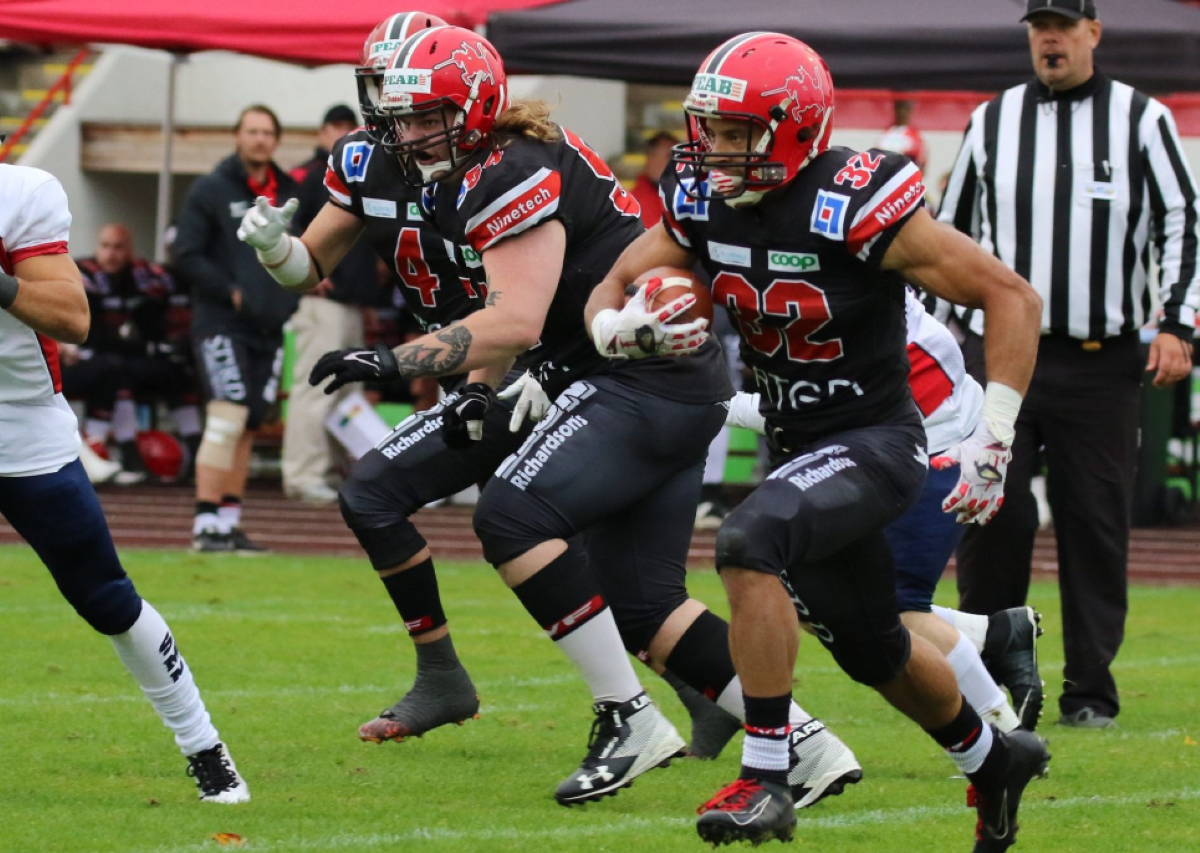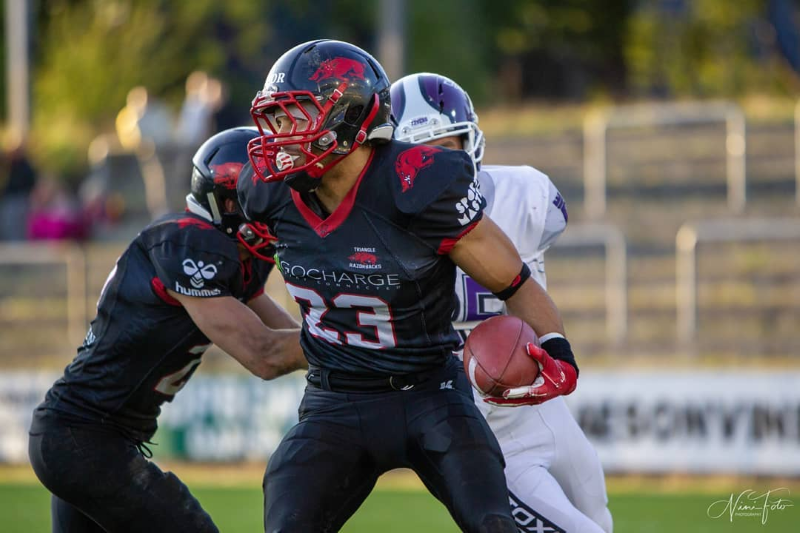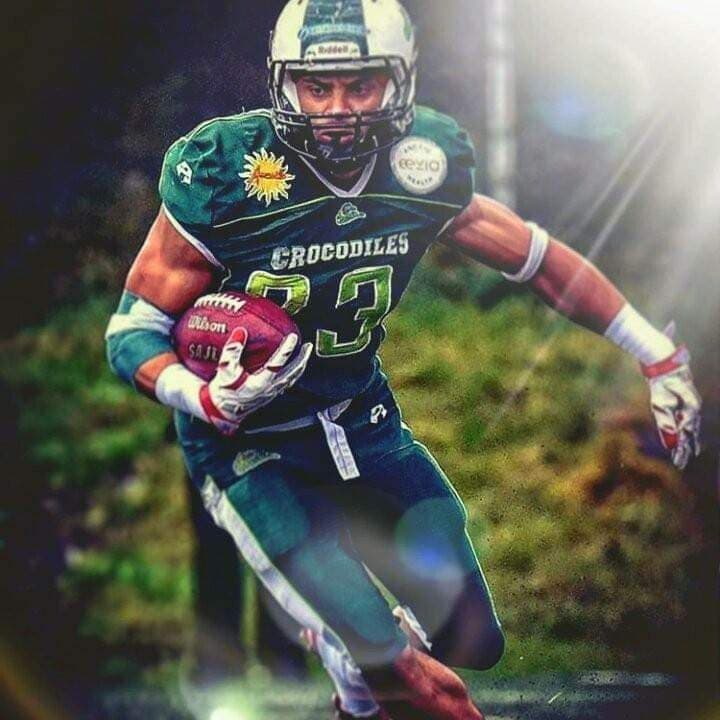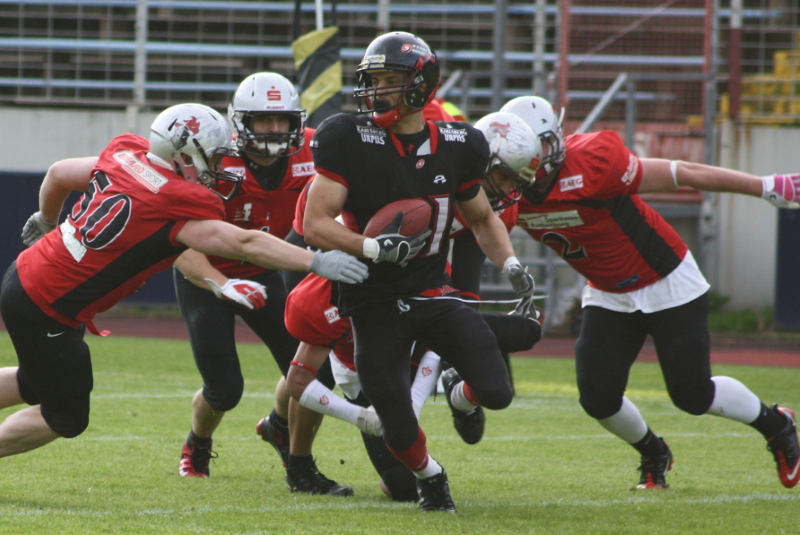Carlstad Crusaders WR Niko Lester finds his identity in service to his team
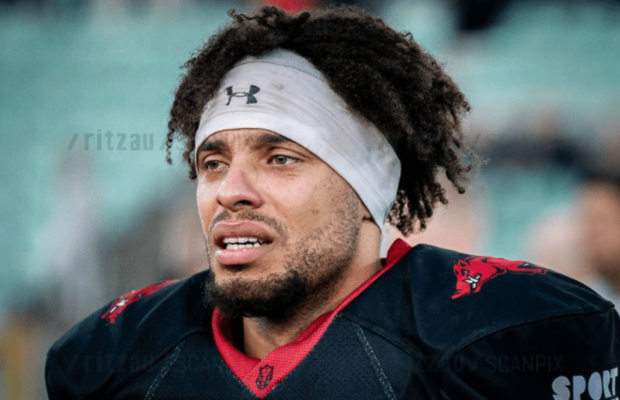
Although the shortened Danish season came to a sudden end, it did have many bright lights, one of them being receiver Niko Lester, now a member of Sweden’s Carlstad Crusaders.
AFI’s JC Abbott spoke with Niko about his career and his thoughts on his role on the teams he has played for through the years.
Football is a game built on its specificity. Roles are defined, players restricted to positions and plays executed with precision. Lester transcends these limits. Some have called the 2019 Danish MVP a Swiss army knife, able to contribute as a runner, receiver, returner or defensive back. Other players with his skillset have dubbed themselves “offensive weapons”, unable to be confined by any traditional positional definition. Lester has a much simpler answer.
“I’m the ultimate team player, if you want to put it like that,” he says thoughtfully, with clear pride in the role.
It should come as no surprise to those who have followed Lester’s career that he is a player difficult to define or that the identity he has constructed for himself centers on helping others. These two themes have followed him his whole life. After all, what else would you expect from a kid raised on a military base and trained to straddle two national identities?
Born in Kaiserslautern, Germany to a German mother and a father in the US Air Force, Lester grew up in a tiny slice of America surrounded by Europe.
“Growing up on the airbase, it’s an isolated community basically. Everything is American. You have the BX (base exchange) and PX (post exchange) where the prices are in American dollars and everything is the same as the States,” he says of the large shopping mall that services the military families that live in Kaiserslautern. “Germans that can’t get on base couldn’t even fathom how it is.”
As Americanized as the airbase might be, growing up in a multi-national household and existing on both sides of the airbase fence created a duality to Lester’s childhood that few can fully appreciate. When asked how he defines his national identity, Lester pauses.
“I get asked that question a lot,” he laughs. “I only spoke German with my mom, only spoke English with my dad. I watched American television because we were on base, but went to a German school. I would say I’m 50/50.”
That balancing act only became more pronounced as he got older. As a kid, he excelled at the European past-time of soccer, but found American football at 17 and quickly discovered he had talent. Selection to the German junior national team inspired him to focus on the gridiron and it wasn’t long before he went off to live with his grandmother in Roxboro, North Carolina with the hopes of attracting a recruiter’s attention. For all its flags and patriotism, the airbase couldn’t provide Lester with the true American experience of high school football and he fell short in his quest to find a college opportunity.
“It just didn’t go my way. I guess I wasn’t that lucky,” Lester says. “Back in the day, we didn’t have the opportunities that the kids today have with PPI and Europe’s Elite.”
He wasn’t about to give up on the dream though and began a cycle of yearly travel, living in Europe during the season to keep playing the game he loved and heading back to the US in the offseason to train and gain exposure. According to Lester, that’s a credit to the American side of his upbringing.
“I guess I’m more mentally and culturally American because I was surrounded by Americans all the time in my early years,” he explains. “I think that has helped me, having that American mentality that you can achieve whatever you believe in if you work hard for it. It distanced me from the European mentality in sports and gave me more competitiveness.”
In pursuit of his dream, Lester built a varied international resume. He’s suited up for the New Yorker Lions, Cologne Falcons both in the German Football League, Finland’s Hämeenlinna Huskies and Seinäjoki Crocodiles, the Horsens Stallions from Denmark as well as Spanish champions, the Badalona Dracs not to mention a stint with the Bloomington Edge of the Champions Indoor Football League. Eventually, he needed something stable and he found it in Denmark’s Triangle Razorbacks.
“I was always back and forth traveling. Getting older, I had to find a team, a spot where I could start a life but also still continue playing the sport that I love,” Lester says of the Vejle based club that he’s been a part of for three years.
Still, Lester trains as hard as anyone because he dreams that one day he’ll have an opportunity arise in the US that will allow him to share a precious moment with family.
“My family in the States has never seen me play. The only way they could watch me is through livestream, so they’ve never seen me live,” he explains. “My grandmother is now 96 and my biggest dream would be for her to see me play live. I’m not giving up on that dream.”
While Lester hopes the work he does all season long brings him closer to his grandmother, his performance on the field is done in service of something greater than himself.
“At the end of the day, the most important thing is the team. Stats, some of these other things that athletes might look at are really irrelevant,” he says about his playing philosophy. “That’s why I play both ways. I try to stay in shape so I can help my team when needed in crucial situations. I put a lot of pressure on myself but I love it. I love to help. Wherever the team needs me, wherever the coach says, I go.”
That too comes from deeply ingrained parts of his childhood.
“I always wanted to become a police officer when I was kid, because I always had this urge to help people when I was young. Then football came along and I stuck with that,” recalls Lester. “It was like the next best thing, other than joining the military, to be a part of something bigger, have your role and makes sure everything clicks so that at the end of the day you get the mission done.”
The Razorbacks would have had a particularly difficult mission had the season not been cancelled abruptly. They would have faced the top-seeded Copenhagen Towers in the semi-finals and Lester had been expecting an exciting game, a rematch of last year’s Mermaid Bowl. With no game now to play, Lester, ever the consummate teammate, thinks about those who didn’t even get a chance to suit up for a game.
“I always feel bad for the players who still show up but don’t make the roster due to the COVID situation,” he says of this year’s smaller roster limits. “That’s what bums me out every week. When we can’t take this player or that player but they’ve been working hard all year.”
Lester had hoped to win it all for those who have sacrificed for the team but don’t always get rewarded. It is just another part of his team-focused mentality, a desire to win and push those around him. While he may not fit neatly into one position or national identity, Lester is happy to be defined by the team and, win or lose, he’s grateful that was able to continue this season.
“My condolences, if I can put it that way, to some of the players in other countries who didn’t have a season, since at least we had part of one,” he says. “I know how much I love it and I know how much it would have changed my life this year if I couldn’t play.”
In many ways, European football is one big team and the “ultimate team player” will be thinking about all his teammates as he begins preparations for an off season that came unexpectedly.
